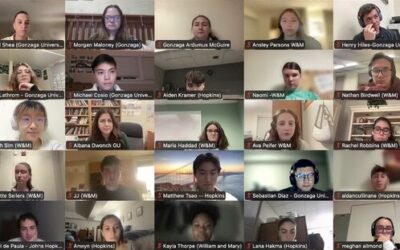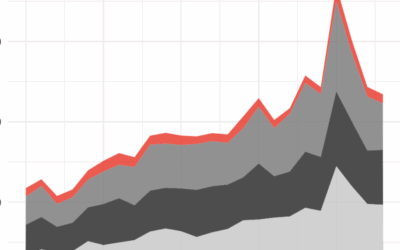About US
Promoting Evidence & Learning About Democratic Backsliding
The Democratic Erosion Consortium (DEC) is a nonpartisan, collaborative effort to address the global challenge of democratic erosion through research, teaching, and multi-stakeholder collaboration. Our focus areas include pedagogy, data collection, research synthesis, and public outreach, with the goal of leveraging evidence to better respond to democratic backsliding worldwide.

Teaching & Learning
Learn about our teaching and pedagogy work, including our Democratic Erosion Course that has been offered at more than 90 universities around the world.

Documenting Democratic Erosion Through Data
Explore and use our Democratic Erosion Event Dataset (DEED), access our online visualizations, or download the full dataset.

Making Evidence Accessible With Briefs
Download our Democratic Erosion Evidence Briefs, which make academic evidence more accessible for policymakers, practitioners, the media, and the broader public.

Fostering Communication, Learning & Partnerships
Join our multi-stakeholder network, attend in-person and virtual roundtables and panels, and sign up for our listserv to stay connected with our network.
Updates
Recent DEC News
Keep up to date with the latest developments from DEC.
DEC University Course Review
Spring 2026 is underway meaning another semester of our joint university course on Democratic Erosion! This semester the DEC course is bringing together 22 universities, 5 of which are new to the DEC network and 3 are abroad! Together the...
DEED v7 Dataset Release
We are excited to announce that Version 7 of the Democratic Erosion Event Dataset (DEED) has now been published! The new version of DEED includes 23,421 event observations related to democratic erosion and autocratic consolidation across 156...
Q&A with Directors of the Democratic Erosion Consortium
The DEC Co-Directors and Research Director had the opportunity to reflect on and discuss our work with Mike Albertus, Professor of Political Science at the University of Chicago, in a Q&A on his Substack, The Good Society. This discussion...
Our Partners
TEACHING
Teaching & Learning
The Democratic Erosion Consortium offers a semester-long standardized university course on democratic erosion, making the syllabus, readings, and collaborative assignments accessible to any faculty member around the world.
DATASET
Understanding Trends in Democratic Erosion
The Democratic Erosion Event Dataset (DEED) tracks discrete events related to democratic erosion and autocratic consolidation across countries and over time, providing valuable insights into the process of democratic erosion around the world.
Briefs
Democratic Erosion Evidence Briefs (DEE-Briefs)
DEE-Briefs increase the accessibility, usefulness, and responsiveness of existing evidence for policymakers, practitioners, and the broader public.
PARTNERSHIPS
Engage with the Democratic Erosion Consortium
We foster partnerships between academics, policymakers, and practitioners through both in-person and online events, providing opportunities to network and engage.
PARTNERSHIPS
Engage with the Democratic Erosion Consortium
We foster partnerships between academics, policymakers, and practitioners, through in-person and online events and opportunities to network and engage.
TEACHING
Teaching & Learning
The Democratic Erosion Consortium offers a semester-long standardized university course on democratic erosion, making the syllabus, readings and collaborative assignments accessible to any faculty member around the world. We will soon be launching an online Democratic Erosion Short Course aimed at policymakers and practitioners.
DATASET
Understanding Trends in Democratic Erosion
The Democratic Erosion Event Dataset (DEED) tracks discrete events related to democratic erosion and autocratic consolidation across countries and over time, providing valuable insights into the process of democratic erosion around the world.
Briefs
Democratic Erosion Evidence Briefs (DEE-Briefs)
DEE-Briefs aim to increase the accessibility, usefulness, and responsiveness of existing evidence for policymakers, practitioners, the media, and the broader public.
FeAtured Blog
Democratic Erosion Course Student Blog
Read featured blog posts from our students’ insightful analysis of current events and democratic backsliding.
Whole-Process People’s Democracy: How China’s Rebranding of Democracy Challenges Global Norms
When Xi Jinping declared that China had achieved “a whole-process people’s democracy,” many outside observers saw the phrase as contradictory. How could an authoritarian, one-party state claim to be democratic? Yet this rhetoric is not mere...
Peru’s Hollow Democracy: How Congress Captured the State
When Peru's Congress voted unanimously on October 10, 2025, to remove President Dina Boluarte for "permanent moral incapacity," the decision was framed as a constitutional act. In reality, it exposed the depth of Peru's institutional decay (again)....
The Politics of Shame: How Bobotante Narrative Poses Threats to Philippine Democracy
In democratic countries, elections are seen as a great equalizer for each individual, as they are entitled to free expression, regardless of their background. However, this is not the case in the Philippines, as the 2022 election has turned into a...
















